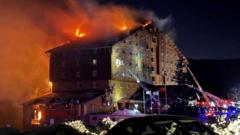The early morning inferno at the Grand Kartal Hotel in Kartalkaya, a popular ski destination in Turkey, claimed at least 76 lives, marking one of the most catastrophic incidents in the nation’s hotel history. As soon as news broke, survivors expressed disbelief that such a high death toll could occur in a facility purported to have functional fire protection systems.
Reports indicate that the fire sparked around 03:27 local time in the restaurant area on the fourth floor, with firefighters arriving approximately 45 minutes later. Eyewitness accounts reveal that guests could detect smoke long before the alarm sounded, leading many to question the hotel’s safety protocols. “The alarm did not go off... It took about an hour to an hour-and-a-half for the fire brigade to come,” recounted Atakan Yelkovan, a guest who feared for his life.
Local authorities confirmed that nine individuals, including the hotel's owner, have been detained as part of their ongoing investigation. Despite officials citing a “fire competence certificate” issued for the hotel, local mayor Tanju Ozcan disputed its validity, claiming a lack of fire safety assessments since 2007.
Experts familiar with fire safety protocols emphasized that fire alarms, if operational, typically alert occupants within seconds, thereby allowing for prompt evacuation. “In an ideal facility, there should be someone monitoring fire systems around the clock,” remarked Kazim Beceren, head of the Turkish Fire Protection and Education Foundation.
Numerous guests described desperate attempts to escape, including tying bedsheets together and even jumping from windows. These harrowing escapes highlight severe inadequacies in the hotel’s fire safety measures. Survivors like Eylem Senturk detailed how the alarm only sounded once she was outside, while her husband faced life-threatening smoke inhalation.
Official inquiries are now focused on whether the hotel met all fire safety requirements, especially given the suggestion that installed systems may have been absent or non-compliant. Furthermore, building materials like the wooden exterior façade have sparked debate about fire resistance standards that, if unmet, could have contributed to the rapid spread of the fire.
The Union of Chambers of Turkish Engineers and Architects pointed out that an automatic sprinkler system was mandatory for establishments of this size, and reports suggest it was not in place, further exacerbating the disaster’s death toll.
Questions remain regarding the oversight of hotel safety protocols, as Bolu Mayor Tanju Ozcan highlighted the Ministry of Tourism’s responsibility, noting that inspections had been neglected for over a decade. Calls for immediate reviews of older structures have surfaced, demanding compliance with current safety standards.
As investigations continue, the public awaits clarity on the tragic circumstances that led to the Grand Kartal Hotel disaster, seeking accountability and measures to prevent future tragedies at crowded destinations across Turkey.
Reports indicate that the fire sparked around 03:27 local time in the restaurant area on the fourth floor, with firefighters arriving approximately 45 minutes later. Eyewitness accounts reveal that guests could detect smoke long before the alarm sounded, leading many to question the hotel’s safety protocols. “The alarm did not go off... It took about an hour to an hour-and-a-half for the fire brigade to come,” recounted Atakan Yelkovan, a guest who feared for his life.
Local authorities confirmed that nine individuals, including the hotel's owner, have been detained as part of their ongoing investigation. Despite officials citing a “fire competence certificate” issued for the hotel, local mayor Tanju Ozcan disputed its validity, claiming a lack of fire safety assessments since 2007.
Experts familiar with fire safety protocols emphasized that fire alarms, if operational, typically alert occupants within seconds, thereby allowing for prompt evacuation. “In an ideal facility, there should be someone monitoring fire systems around the clock,” remarked Kazim Beceren, head of the Turkish Fire Protection and Education Foundation.
Numerous guests described desperate attempts to escape, including tying bedsheets together and even jumping from windows. These harrowing escapes highlight severe inadequacies in the hotel’s fire safety measures. Survivors like Eylem Senturk detailed how the alarm only sounded once she was outside, while her husband faced life-threatening smoke inhalation.
Official inquiries are now focused on whether the hotel met all fire safety requirements, especially given the suggestion that installed systems may have been absent or non-compliant. Furthermore, building materials like the wooden exterior façade have sparked debate about fire resistance standards that, if unmet, could have contributed to the rapid spread of the fire.
The Union of Chambers of Turkish Engineers and Architects pointed out that an automatic sprinkler system was mandatory for establishments of this size, and reports suggest it was not in place, further exacerbating the disaster’s death toll.
Questions remain regarding the oversight of hotel safety protocols, as Bolu Mayor Tanju Ozcan highlighted the Ministry of Tourism’s responsibility, noting that inspections had been neglected for over a decade. Calls for immediate reviews of older structures have surfaced, demanding compliance with current safety standards.
As investigations continue, the public awaits clarity on the tragic circumstances that led to the Grand Kartal Hotel disaster, seeking accountability and measures to prevent future tragedies at crowded destinations across Turkey.


















